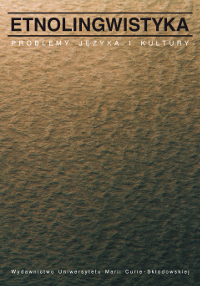Представления о родине и чужбине в сознании современных русских
THE CONCEPTUALIZATION OF 'RODINA' (HOMELAND) AND 'CHUZHBINA' (FOREIGN LAND) BY CONTEMPORARY RUSSIANS
Author(s): Vladislava ŽdanovaSubject(s): Language studies, Language and Literature Studies, Applied Linguistics
Published by: Wydawnictwo Naukowe Uniwersytetu Marii Curie-Sklodowskiej
Keywords: COGNITIVE SEMANTICS; CONCEPTS; MENTAL WORLDVIEW
Summary/Abstract: The article presents the ideas cherished by Moscow-based Russians of two points in their mental worldview: 'homeland' and 'foreign land'.The semantics of transfer from one's own space to foreign, alien space is analyzed on the basis of the concept of 'emigration'. A cognitive-associative experiment was conducted among Moscow students in 2001. In the first part, respondents were asked to spontaneously react to prompt words representing their own or foreign space ('dom' home, 'rodina' homeland, 'chuzhbina' foreign land, 'russkii' Russian etc.). In the second part they were asked to define these concepts. The answers were then divided into thematic categories according to the principle of distinguishing the semantic determinant. Whole semantic components and individual reactions were compared and juxtaposed with folk and literary data. A conclusion is drawn that in the consciousness of present-day students, 'homeland' consists of 'dom' (home), 'semya' (family), 'blizkye' (the close ones) and 'rodnoya' (relatives). These components of the sphere of 'semya' (family) are transferred, with the omission of indirect components of the schema of one's own space, onto the realm of the country, delimited above all in a cultural-linguistic, rather than political manner. 'Chuzhbina' (foreign land), perceived in an opposition to 'rodina' (homeland), is more often conceptualized as a distant portion of space, lacking componential structure. Introspection allows one to see the foreign land as a place which does not meet a whole range of conditions necessary for a harmonious existence of humans.
Journal: Etnolingwistyka. Problemy Języka I Kultury
- Issue Year: 16/2004
- Issue No: 16
- Page Range: 129-147
- Page Count: 19
- Language: Russian

